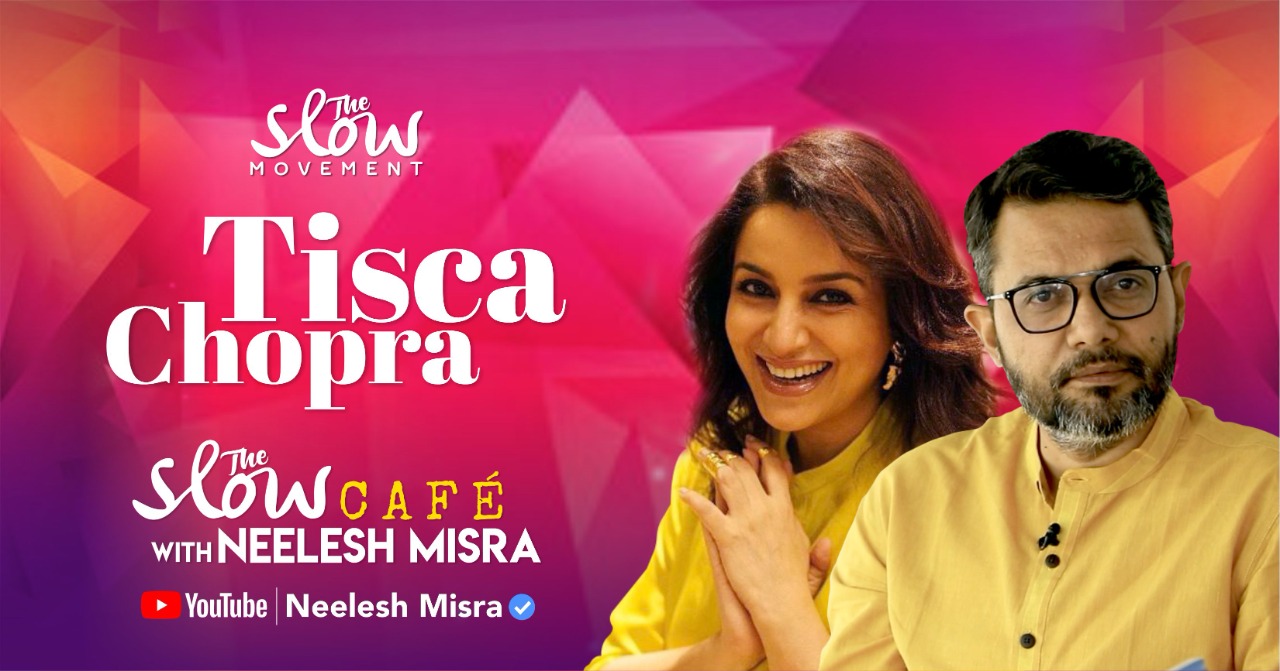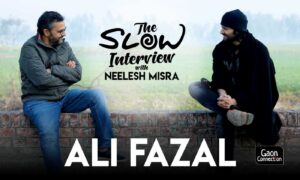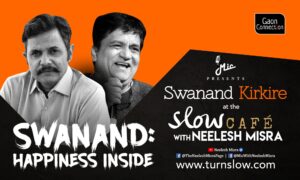Once success comes calling, people like to put forth a version of their early days that’s either satin-smooth or pock-marked, and painted in distinct white or black, the “I was good, they were bad” or “I was in a bad space and then stardom happened” narrative. The in-between phase is not really inhabited. Rarely does someone speak about the absolutely everyday things that took place; these are things everyone would have experienced, and stored for posterity in the “silly” compartment of one’s memories.
Neelesh Misra’s The Slow Cafe with Tisca Chopra was just that. A lingering conversation between a storyteller and a person who once told stories and got her brother to complete her work for her. It travelled from Sanawar, Kasauli and Kabul to Delhi, Kolkata and Noida… before shifting to Mumbai. A traveller always has more tales to narrate and that’s the case here too.
The daughter of teachers, Chopra was named after a student her father met in England when he was teaching there. “He decided, before I was born, that if he had a daughter, she’d be called Tisca,” she said, adding “I’m actually Tisca Zareen Arora” who later became a Chopra. The Zareen portion harks back to when a student at Lawrence School, Sanawar, where her father was teaching, saw her as a baby and thought she looked shiny like zari!
And so the girl with a first and middle name inspired or given by others, would eventually go on to create her space under the sun and make a name of her own. But, before that, she was the typical daughter of the mountains born in the military hospital at Kasauli. “I remember going on long walks with my father — we covered kilometre after kilometre — the tall fir and pine trees, the gentle rain, wet roads, the twinkling lights in the villages in the valley, the rustling branches, the fragrance of the breeze that travelled through those trees…”
Of course, she would eventually become a writer too. Remember the short film Chutney, that she co-wrote?
But, there’s more history in the offing. Some years were spent in Kabul, Afghanistan, when Chopra’s father SC Arora was principal of the India School there. “Our walks continued there too. We would walk up a hill in companionable silence. I’d give millions for that breeze again,” she recalled. These are nuggets the regular interview format does not allow for, the meandering of thoughts, the time travel…
Always the introvert, Chopra entertained the domestic help when her parents went out to socialise. She spoke of Zeenat and Zainab cinemas where films starring Amitabh Bachchan and Kader Khan would play. And then said she was on the wrong side of the drug debate early on. “I used to narrate stories and sang songs for our help, and refused to sleep. That’s when they gave me little doses of naswār, a kind of snuff. My parents were shocked when they found out.”
Growing up amid just about a thousand Indians, Chopra’s idea of crackers was about two pieces in hand during Diwali and a fistful of colour during Holi. Kachchi bhindi meant a little packet that someone who went home brought back. “In my head, everything about India was glorified. India was my Xanadu.”
And so, she landed back here, but not in the way she expected to. The family fled Kabul overnight when the situation there changed. She brought back with her the Farsi language, stones she’d collected and memories of a childhood that changed abruptly. In Delhi, the siblings wondered why everyone wore nightsuits (kurta-pjyama) to the market, and in Kolkata, tall Chopra bent to fit into the minibus.
The best story of all is the one relating to the blue fibre-glass vehicle that ferried her and the family around in Delhi. The driver Puran apparently used to be former Prime Minister Atal Bihari Vajpayee’s cook, who wanted a change of profession. “I’d sit in that vehicle and since my seat faced the other direction, could see everyone pass, including my crush, till the end of the road. After a trip to Wenger’s in Connaught Place, though, which took two hours from Noida, instead of the usual 20 minutes, and where the vehicle stalled due to a faulty spark plug, Puran went back to making rotis.
This was the time Chopra’s father wanted her to be a version of famous journalist Christiane Amanpour and parajump to Bosnia. Instead, in Delhi, she posed for leather wear and sequined dresses, and wore purple eyeshadow and green mascara and coin-sized blush-ons, firmly believing she was the best.
Writing for a local magazine gave her Rs 150 or Rs 200, a huge sum that helped her get bun-anda for friends. Then, there were announcements on All India Radio, the Youth Forum show in Delhi…
After making a life for herself in her “spirit city” Mumbai, Chopra admits she misses the hills. “I wish to walk, but there’s no place. The weather still bothers me, but I love it here. No one asks questions, they let you be. This city is about work and this is my work home. I love the work ethic here.”
Soon the conversation veers to the stories Misra and Chopra narrate. “We are the stories that we tell,” she says, calling Misra a storyteller and “encourager of stories”. “We say ‘I am rebellious’, ‘I am of liberal thought’…these are stories that we tell too, right?” she asked.
Speaking about the Hindi film industry, where she made a huge mark in Taare Zameen Par, Chopra says that the industry slots actresses as ‘babe’, ‘bhabhi’ or ‘beeji’. “I’m now neither bhabhi nor beeji and am trying to stay relevant,” she laughed.
After Chutney (130 million-plus views), she’s acted in, produced and directed one more short, co-written with Namrata Shenoy, which releases in November this year. “The process of acting and directing are vastly different. Acting is internal. Direction is about observation. I was lost in between when I became flat emotionally. Now, the film is done,” said Chopra, who has also worked on the script for a feature film.
Did you know Chopra also did a stint at the think tank National Knowledge Commission, then headed by Sam Pitroda? “I found him the most intelligent man I’d met; he never repeated a single thought. We did an outreach in Thiruvananthapuram where children in district schools were taught life skills too.”
This part of the conversation turns out to be most educative. Misra speaks of how children in the village school his parents began in rural Uttar Pradesh have been taking online classes for some time now (after a long struggle for a good Internet connection), and how resources from across the country have been helping. Singer Rekha Bhardwaj has promised to help them sing, a teacher from Mussoorie is going to teach them…the crisis is when finances have to be raised. “Ninety per cent of the issue has to do with finances. Once that is sorted, work can begin,” said Misra.
Chopra recalled a trip to Patti Kalyana, a village between Sonipat and Panipat. “There’s an ashram modelled on Gandhiji’s ideals,” she said. This is a place where people are taught to live in sync with Nature. “Village children come to learn here, as the ashram believes those unwell can at least sit and teach. If every village had such a centre attached…” hoped Chopra.



















